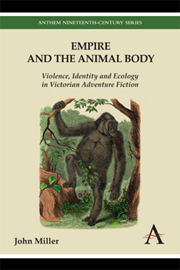Chapter One - Otherness and Order
Published online by Cambridge University Press: 05 April 2013
Summary
Imperial Adventures
At the outset of his 1980 Dreams of Adventure, Deeds of Empire, Martin Green summarises the political investments of adventure fiction:
[T]he adventure tales that formed the light reading of Englishmen for two hundred years and more after Robinson Crusoe were, in fact, the energising myth of English imperialism. They were, collectively, the story England told itself as it went to sleep at night; and, in the form of its dreams, they charged England's will with the energy to go out into the world and explore, conquer and rule.
To Green, adventure constitutes a meeting point of literature and politics. Tales of derring-do in foreign lands reflected and promoted Britain's developing colonial interests and burdened the ‘light reading of Englishmen’ with some heavy ideological baggage. Far from a discovery of the postcolonial moment, this textual politics was an overt and self-conscious commitment for many practitioners of adventure fiction, most notably in the second half of the nineteenth century when the height of the British Empire saw a proliferation not only of sporting texts, but, connectedly, of imperial adventures. The poet and distinguished Indian civil servant Alfred C. Lyall, writing in 1894 of the ‘expansion of British enterprise’ across Africa, the South Sea Islands and India, commented that ‘the Novel of Adventure […] is drawing copious sustenance from these outlying regions’. Comparably, in a survey of Literature of the Empire(1924), the literary historian E. G. Salmon anticipated Green's conclusion as he addressed the political undercurrents of adventure, rather more flamboyantly, in a rhetorical question: ‘How far have action and thought been inter-related?
- Type
- Chapter
- Information
- Empire and the Animal BodyViolence, Identity and Ecology in Victorian Adventure Fiction, pp. 23 - 56Publisher: Anthem PressPrint publication year: 2012

